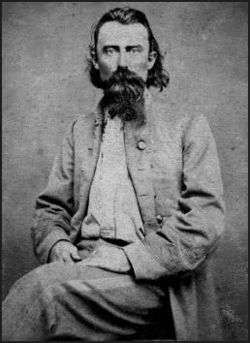Joseph Shelby
| Joseph O. Shelby | |
|---|---|

Shelby during the American Civil War
|
|
| Birth name | Joseph Orville Shelby |
| Nickname(s) | Jo Shelby |
| Born | December 12, 1830 Lexington, Kentucky |
| Died | February 13, 1897 (aged 66) Adrian, Missouri |
| Allegiance |
United States of America State of Missouri Confederate States of America |
| Service/ |
Missouri State Guard Confederate States Army |
| Years of service | 1861 (Missouri State Guard) 1861–1865 (CSA) |
| Rank |
|
| Commands held | Shelby's Iron Brigade |
| Battles/wars |
|
| Spouse(s) | Elizabeth Nancy Shelby (Betty, Betsy) |
Joseph Orville "Jo" Shelby (December 12, 1830 – February 13, 1897) was a Confederate cavalry general noted for his actions in the Trans-Mississippi Theater of the American Civil War.
Shelby was born in Lexington, Kentucky to one of the state's wealthiest and most influential families. He lost his father at age five, and was raised by a stepfather. Shelby attended Transylvania University and was a rope manufacturer until 1852. He then moved to Waverly, Missouri, where he engaged in steamboating on the Missouri River. He also ran a hemp plantation, a ropeworks, and a sawmill.
During the Bleeding Kansas struggle of the mid-1850s, Shelby organized the pro-slavery "Blue Lodge" group in Waverly and led a company of Border Ruffians. Shelby's first direct involvement in Kansas was at Lawrence during the March 30, 1855 election of the Kansas territorial legislature. Many Missourians without residence in the territory voted illegally in the election. This was partially achieved through intimidation of election judges, who were prevented from administering residency oaths. Additionally, Shelby and other Missourians harassed several abolitionists attempting to vote, although they were generally not prevented from doing so.
Shelby's leadership in the Missouri–Kansas border war damaged his business ventures and partnership with his stepbrother, Henry Howard Gratz. In December 1855, their new sawmill burned, and evidence suggested the use of an incendiary. The mill was uninsured and losses exceeded $9,000. Gratz returned to Lexington, Kentucky, and Shelby auctioned off the business in February 1860.
...
Wikipedia
